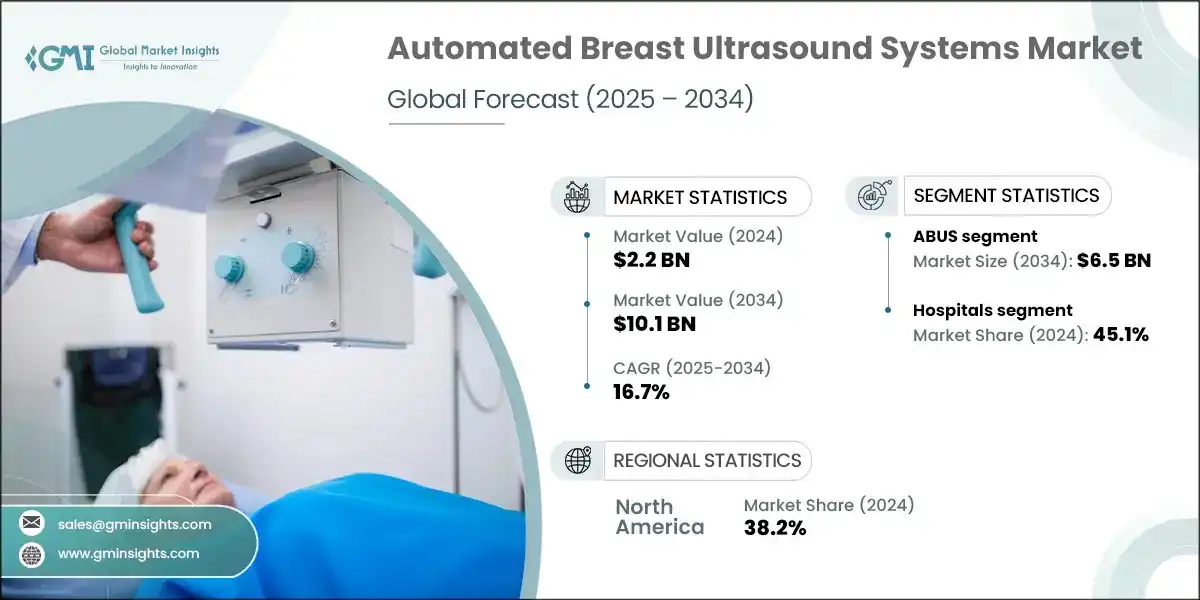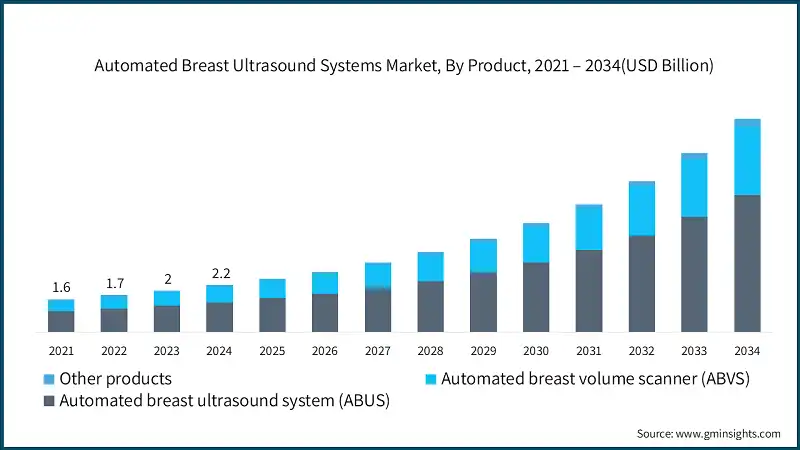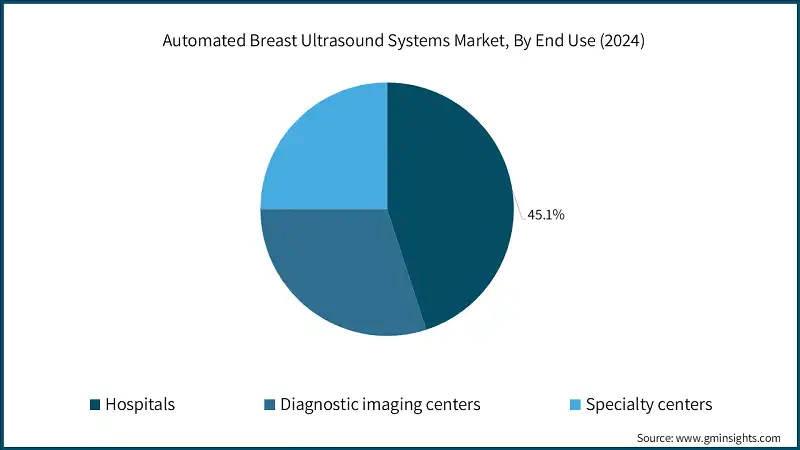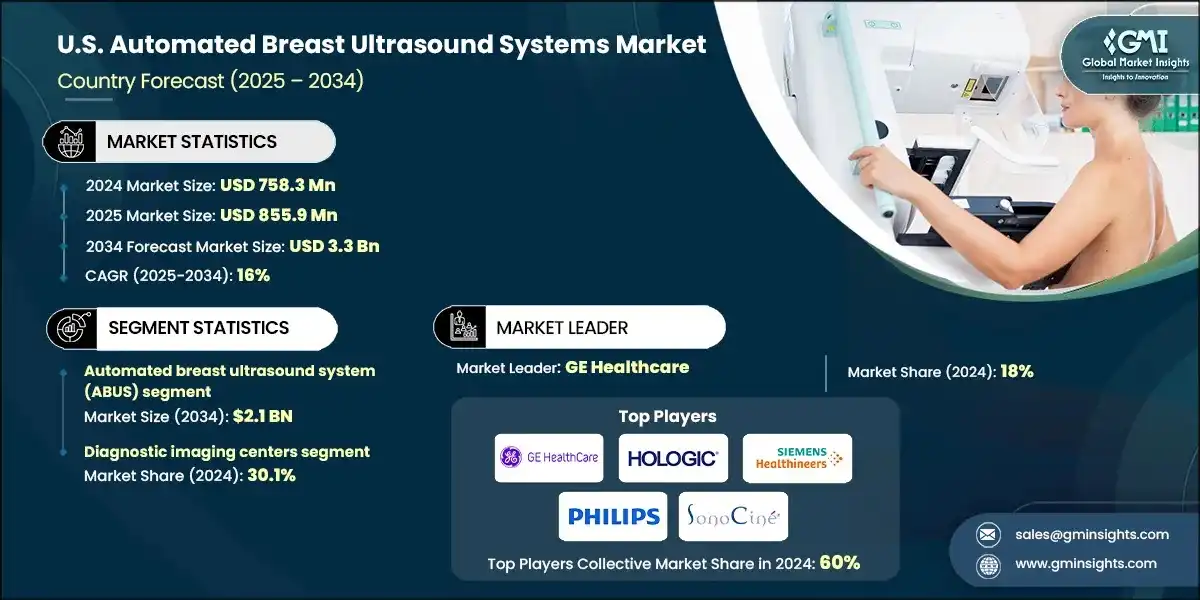Summary
Table of Content

Automated Breast Ultrasound Systems Market
Get a free sample of this report
Form submitted successfully!
Error submitting form. Please try again.
Thank you!
Your inquiry has been received. Our team will reach out to you with the required details via email. To ensure that you don't miss their response, kindly remember to check your spam folder as well!

Request Sectional Data
Thank you!
Your inquiry has been received. Our team will reach out to you with the required details via email. To ensure that you don't miss their response, kindly remember to check your spam folder as well!
Form submitted successfully!
Error submitting form. Please try again.
Automated Breast Ultrasound Systems Market Size
The global automated breast ultrasound systems market was valued at USD 2.2 billion in 2024 and is projected to grow from USD 2.5 billion in 2025 to USD 10.1 billion by 2034, expanding at a CAGR of 16.7%. The global market is experiencing significant growth, driven by the rising prevalence of breast cancer worldwide, growing awareness about early detection, proactive government initiatives, and rapid technological advancements in automated breast ultrasound systems.

To get key market trends
Automated breast ultrasound systems (ABUS) are advanced imaging technologies that provide comprehensive 3D visualization of breast tissue, making them particularly beneficial for women with dense breasts. These systems are increasingly being adopted in clinical environments such as hospitals, diagnostic centers, and breast care clinics. Major companies in the ABUS market include GE Healthcare, Siemens Healthineers, Koninklijke Philips, Hologic, and SonoCine. The market focuses on devices that offer automated scanning, consistent image acquisition, and enhanced lesion detection, aiming to improve diagnostic accuracy and support early breast cancer detection.
The market grew from USD 1.6 billion in 2021 to USD 2 billion in 2023. This growth is primarily attributed to the rising incidence of breast cancer and increasing awareness about early detection. The adoption of automated breast ultrasound systems has accelerated, driven by advancements in imaging technology and supportive regulatory frameworks. Additionally, the healthcare sector's emphasis on personalized and patient-centric diagnostics has positioned ABUS as a valuable complement, offering enhanced lesion detection, operator-independent imaging, improved diagnostic confidence, and a more comfortable screening experience.
The rising prevalence of breast cancer is one of the key factors aiding in the growth of the automated breast ultrasound systems market. For instance, in 2022 alone, 2.3 million women were diagnosed with breast cancer, and 670,000 lost their lives globally. Thus, the statistics highlight the urgent need for advanced diagnostic tools. Automated breast ultrasound systems, especially those equipped with digital and AI capabilities, are increasingly adopted by hospitals and other end users all over the world to improve their screening capabilities.
Additionally, growing awareness and rising breast cancer screening programs have become pivotal in combating breast cancer. The efforts are further bolstered by government and health organization initiatives that aim at promoting early detection through the widespread adoption of automated breast ultrasound systems and AI-enhanced imaging technologies. For example, the CDC's National Breast and Cervical Cancer Early Detection Program has facilitated breast and cervical screenings for over 6 million women and has accelerated the integration of ABUS into routine screening protocols. In regions with high breast cancer prevalence, targeted campaigns are leveraging ABUS to improve diagnostic accuracy, encourage annual screenings, and ultimately reduce mortality rates. Thus, the combination of ABUS with AI-powered diagnostics has become a cornerstone of modern breast cancer screening, offering precise, reproducible imaging that supports radiologists in making more confident and earlier diagnoses.
ABUS is a specialized screening technology designed to detect breast cancer in women with dense breast tissue. Unlike traditional handheld ultrasounds, ABUS uses a wide, automated transducer to capture standardized, high-resolution 3D images of the entire breast. This approach reduces operator dependency and ensures more consistent results.
Automated Breast Ultrasound Systems Market Report Attributes
| Key Takeaway | Details |
|---|---|
| Market Size & Growth | |
| Base Year | 2024 |
| Market Size in 2024 | USD 2.2 Billion |
| Forecast Period 2025 - 2034 CAGR | 16.7% |
| Market Size in 2034 | USD 10.1 Billion |
| Key Market Trends | |
| Drivers | Impact |
| Growing prevalence of breast cancer worldwide | Drives demand for ABUS as an effective early detection tool, especially for dense breast tissue. |
| Rising technological advancements in automated breast ultrasound systems | Enhances imaging precision, patient comfort, and diagnostic reliability, leading to wider adoption. |
| Limited capability of mammography in dense breast tissue patients | Positions ABUS as a necessary supplemental screening method, increasing its clinical relevance. |
| Rising awareness and favorable government initiatives regarding breast cancer | Boosts ABUS adoption through public health campaigns and funding support. |
| Increased reimbursement for breast ultrasound and digital breast tomosynthesis in the U.S. | Improves affordability and accessibility of ABUS, encouraging provider investment. |
| Increasing national breast screening programs across the globe | Accelerates the adoption of ABUS by integrating it into large-scale screening initiatives, especially for women with dense breast tissue. |
| Pitfalls & Challenges | Impact |
| High cost of the automated breast ultrasound system | Limits adoption in smaller clinics and low-resource settings due to budget constraints. |
| Limited awareness of ABUS in developing countries | Slows market growth and utilization in regions with lower healthcare infrastructure. |
| Lack of skilled or trained personnel in emerging nations | Hinders effective implementation and interpretation of ABUS results. |
| Opportunities: | Impact |
| Rising adoption of AI-integrated ABUS for predictive breast cancer screening | Enhances diagnostic accuracy, streamlines workflow, and enables predictive screening strategies. |
| Market Leaders (2024) | |
| Market Leaders |
13% Market share |
| Top Players |
Collective market share in 2024 is 52% |
| Competitive Edge |
|
| Regional Insights | |
| Largest Market | North America |
| Fastest Growing Market | Asia Pacific |
| Emerging Country | India, Brazil, Mexico, and South Africa |
| Future Outlook |
|
What are the growth opportunities in this market?
Automated Breast Ultrasound Systems Market Trends
- ABUS are changing the way breast imaging is done. They offer standardized, high-resolution 3D imaging that makes it easier to detect lesions, especially in women with dense breast tissue. By reducing the need for operator expertise, these systems ensure consistent results across screenings, making them a reliable tool in everyday clinical workflows.
- ABUS platforms now come with advanced artificial intelligence tools that help classify lesions, predict risks, and interpret images. These AI-powered features not only speed up diagnostics but also make them more accurate while easing the workload for radiologists, particularly in busy screening environments.
- For instance, GE Healthcare's Invenia ABUS 2.0 is the first FDA-approved ultrasound supplemental screening technology specifically designed to detect cancer in dense breast tissue.
- Similarly, Siemens' ACUSON S2000 automated breast volume scanner (ABVS) delivers exceptional clarity in dense breast ultrasounds, boosting clinical confidence and making workflows more efficient.
- Further, technological innovations in ABUS also include real-time analytics, computer-aided detection (CAD), and radiomics-based imaging, which enable deeper insights into tissue characteristics and support personalized screening strategies. These capabilities are important for early detection and treatment planning.
- With continuous advancements in imaging precision, AI integration, and workflow optimization, ABUS is becoming an essential component of breast health management. Their ability to enhance early detection, improve diagnostic accuracy, and streamline clinical workflows is driving increased adoption globally, thus fueling significant growth of the ABUS market.
Automated Breast Ultrasound Systems Market Analysis

Learn more about the key segments shaping this market
The global market was valued at USD 1.6 billion in 2021. The market size reached USD 2 billion in 2023, from USD 1.7 billion in 2022.
Based on the product, the automated breast ultrasound systems market is segmented into ABUS, automated breast volume scanner (ABVS), and other products. The ABUS segment led this market in 2024, accounting for the highest market share due to its ability to deliver standardized 3D imaging, support multimodal integration, and incorporate advanced diagnostic tools. This segment was valued at USD 1.4 billion in 2024 and is projected to reach USD 6.5 billion by 2034, growing at a CAGR of 16.9%.
The growth is driven by rising demand for AI-powered imaging solutions, increased awareness of breast cancer screening, and the expanding use of ABUS in hospitals and diagnostic centers for dense breast tissue evaluation and early cancer detection. In comparison, the ABVS segment, valued at USD 729.8 million in 2024, is expected to grow to USD 3.3 billion by 2034, at a CAGR of 16.4%. Its diagnostic accuracy and patient benefits make it a valuable tool in early breast cancer detection.
- ABUS brings significant benefits to breast cancer screening, especially for women with dense breast tissue. These systems deliver high-resolution, 3D imaging, helping radiologists to see tissue layers more clearly and detect small or hidden lesions that traditional mammography might miss.
- For instance, SonoCine's automated whole breast ultrasound has shown an impressive increase of up to 100% in detecting small, early-stage invasive breast cancers. This is particularly impactful for the more than 45% of women with dense breasts or implants.
- ABUS also offers automated, operator-independent imaging, ensuring consistent image quality and reproducibility across different patients and facilities.
- Further, these systems are designed with patient comfort in mind. Gentle compression and ergonomic scanning techniques make the procedure more comfortable, encouraging women to undergo routine screenings. Many women describe the experience as painless. Additionally, the compact design of ABUS devices makes them a great fit for outpatient clinics and mobile screening units, improving access to care.

Learn more about the key segments shaping this market
Based on end use, the automated breast ultrasound systems market is segmented into hospitals, diagnostic imaging centers, and specialty clinics. The hospitals segment accounted for the highest market share of 45.1% in 2024.
- Hospitals hold the largest market share due to their use of advanced imaging infrastructure and the availability of trained radiologists. As the primary centers for breast cancer screening, diagnosis, and treatment, hospitals are the biggest users of automated breast ultrasound systems.
- Hospitals also handle large patient volumes, benefit from state-sponsored screening programs, and operate within integrated healthcare networks, all of which support the adoption of advanced diagnostic imaging equipment. ABUS is often used alongside other imaging methods, enhancing hospitals' ability to provide comprehensive breast care.
- Additionally, the diagnostic imaging centers segment, accounting for 30% market share in 2024, is experiencing rapid growth driven by the expansion of dedicated breast imaging facilities and outpatient diagnostic clinics. These centers are increasingly adopting ABUS systems due to their compact design and ease of use, making them ideal for diagnostic services.

Looking for region specific data?
North America dominated the global automated breast ultrasound systems market with the highest market share of 38.2% in 2024. The region has advanced healthcare infrastructure, and the rate of adoption of innovative medical technologies is also high. Further, there is an increasing prevalence of breast cancer in the U.S. and Canada, thus propelling the growth of this market.
- The U.S. automated breast ultrasound systems market was valued at USD 542.2 million and USD 604.3 million in 2021 and 2022, respectively. In 2024, the market size reached USD 758.3 million from USD 675.5 million in 2023.
- The rising prevalence of breast cancer in the U.S. is a key factor driving the market's growth.
- For instance, according to the American Cancer Society, breast cancer is the most frequently diagnosed cancer among women in the U.S., making up about 30% (or 1 in 3) of all new female cancer cases each year. By 2025, experts estimate that approximately 316,950 new cases of invasive breast cancer and 59,080 cases of ductal carcinoma in situ (DCIS), a non-invasive form, will be diagnosed.
- Therefore, as the number of breast cancer cases in the country increases, so does the demand for effective and technologically advanced automated breast ultrasound systems for early detection and staging of cancer, thereby accelerating market growth in the country.
- Additionally, the U.S. benefits from a streamlined regulatory approval process, high public awareness, and significant investments in research and development, all of which support the steady introduction of innovative imaging solutions.
Europe automated breast ultrasound systems market accounted for USD 648.9 million in 2024 and is anticipated to show lucrative growth over the forecast period.
- The growth of the market in the region is primarily driven by technological advancements in automated breast ultrasound systems. Innovations such as 3D imaging, high-resolution imaging, and integration of artificial intelligence are enhancing diagnostic efficiency and precision, making imaging more accessible in the region.
- Moreover, European governments are heavily investing in healthcare infrastructure, further encouraging the adoption of ABUS in the region. For example, it is estimated that member countries of the European Union have allocated over USD 11.6 billion (EUR 10 billion) for healthcare infrastructure investments between 2021 and 2027.
Germany automated breast ultrasound systems market is projected to experience steady growth between 2025 and 2034.
- The market in Germany is growing steadily, driven by an increase in breast cancer cases and a strong healthcare system. For example, Statista reported that in 2022, breast cancer had the highest incidence rate among women, with 148 cases per 100,000 people.
- Therefore, as breast cancer cases continue to rise, the demand for advanced diagnostic tools, such as automated breast ultrasound systems, increases. These systems are crucial for early detection, monitoring, and effective management of breast cancer, thereby driving substantial growth in the automated breast ultrasound systems market in Germany.
- In addition, public health measures and reimbursement coverage for breast cancer screening are on the rise in Germany. For instance, as a part of the national breast cancer screening program, Germany offers biennial mammogram screenings at no cost to women aged 50-75 years. This also includes subsidizing adjunct imaging in dense-breast patients, thus fostering the uptake of automated ultrasound systems.
The Asia Pacific region is projected to be valued at USD 574.6 million in 2025 and is expected to reach USD 2.4 billion by 2034.
- Countries such as China, India, and Japan are also adopting advanced technologies at a fast pace. This shift is being driven by the growing demand for innovative diagnostic solutions and better access to healthcare services.
- In addition, the rapid growth of hospitals and diagnostic centers, along with government efforts to improve diagnostic capabilities, is playing a major role in boosting the market in the region.
China automated breast ultrasound systems market is poised to witness lucrative growth between 2025-2034.
- The country has one of the fastest aging populations, which necessitates frequent health monitoring.
- For instance, as per the estimates from World Health Organization (WHO), in 2019, approximately 254 million people of age group 65 and above were residing in the country. This number is projected to rise significantly, with 402 million people expected to be over the age of 60 by 2040.
- This aging population is driving the demand for early detection and preventive healthcare, leading to a higher adoption of digital and AI-powered automated breast ultrasound systems.
- Moreover, government programs and public awareness campaigns are making screening services more accessible, positioning China as a leading player in the Asia-Pacific imaging market.
Brazil in Latin America is experiencing significant growth in the automated breast ultrasound systems market, driven by its expanding adoption of chronic disease management.
- In Brazil, breast cancer continues to be the most commonly diagnosed cancer among women. According to the Global Cancer Observatory, around 66,280 new cases were reported in 2020. This accounted for 29.7% of all cancer types, with an incidence rate of 43.7 per 100,000 women. As breast cancer becomes more prevalent, the need for advanced, non-invasive diagnostic tools, such as automated breast ultrasound systems and AI-powered imaging technologies, is growing.
- There is also a rising awareness about the importance of early detection and prevention. Public health initiatives and educational campaigns are encouraging more people to undergo regular health screenings. This shift is expected to play a key role in driving the growth of the market in the region.
Saudi Arabia in the Middle East and Africa automated breast ultrasound systems market is expected to experience significant and promising growth from 2025 to 2034.
- In Saudi Arabia, the elderly population is growing rapidly. By 2050, the number of people aged 60 and above is projected to increase from 2 million (5.9% of the total population) in 2020 to 10.5 million. Since older individuals are more vulnerable to cancer, this demographic change is likely to increase the demand for automated breast ultrasound systems.
- Additionally, public health campaigns and national screening programs are fueling the need for diagnostic imaging solutions, contributing to significant market growth in the country.
- Government initiatives and healthcare projects are also improving access to automated breast ultrasound systems, making these solutions more widely available across the nation.
Automated Breast Ultrasound Systems Market Share
- The top 5 players, such as GE Healthcare, Hologic, Siemens Healthineers, SonoCine, and Koninklijke Philips, collectively held 52% of the total market share. These firms retain their leadership through a mix of technological advancements, AI incorporation, regulatory clearance, and strategic collaborations with healthcare organizations.
- GE Healthcare continues to lead the way in the ABUS segment with its advanced 3D ultrasound platforms, specifically designed to make breast cancer screening more effective. Their latest innovations include AI-driven tools such as scan quality assessment, auto nipple detection, and fast scan technology. These features not only improve image consistency, reduce scan time and give doctors more confidence when diagnosing dense breast tissue. GE's systems are built to handle high patient volumes and offer remote reading capabilities, making them suitable for both centralized and decentralized care setups.
- Manufacturers in the ABUS space are focusing on value-based strategies to reach cost-sensitive markets, especially in regions such as Asia-Pacific and Latin America. They are launching compact, mobile ABUS platforms with ergonomic designs, cloud-based data sharing, and AI-powered lesion detection. These systems are designed for outpatient clinics and mobile screening units, helping to bring breast cancer diagnostics, which is estimated to reach USD 66.9 billion by 2032, to underserved and semi-urban areas where access to healthcare can be limited.
- The ABUS market is evolving with trends such as AI-integrated imaging systems, radiomics-enabled platforms, and tools that streamline diagnostic workflows. These advancements are being driven by the growing need for early-stage breast cancer detection, particularly for women with dense breast tissue, and a global move toward more personalized and less invasive screening options.
Automated Breast Ultrasound Systems Market Companies
Few of the prominent players operating in the automated breast ultrasound systems industry include:
- Canon
- CapeRay Medical
- Delphinus Medical Technologies
- GE Healthcare
- Hitachi
- Hologic
- Koninklijke Philips
- Metritrack
- QView Medical
- Real Imaging
- SonoCine, Inc.
- Supersonic Imagine
- Siemens Healthineers
- Seno Medical Instruments Inc.
- Shantou Institute of Ultrasonic Instruments
- Theraclion
- GE Healthcare
GE HealthCare leverages its extensive global workforce of over 51,000 employees to drive innovation in automated breast ultrasound systems. Its product portfolio includes the Invenia ABUS 2.0, which focuses on patient-centered design and advanced imaging capabilities. GE's dedication to precision health and AI integration enhances diagnostic workflows and supports personalized care delivery.
- Koninklijke Philips
Koninklijke Philips has a robust geographical presence, which enables it to enhance its market reach. Koninklijke Philips operates in more than 100 countries, thus comprising a strong distribution network.
- Siemens Healthineers
Siemens Healthineers holds a significant share in the automated breast ultrasound systems market through its comprehensive product portfolio. Siemens Healthineers emphasizes R&D and product development offerings with advanced imaging capabilities, ergonomic designs, and AI-powered diagnostic tools.
Automated Breast Ultrasound Systems Industry News:
- In March 2025, GE HealthCare launched the Invenia ABUS Premium, a next-generation 3D breast ultrasound system featuring advanced AI and workflow enhancements. This innovation strengthened GE's position in the ABUS market by offering faster scan times, improved image consistency, and enhanced diagnostic accuracy, particularly for dense breast tissue.
- In March 2023, MetriTrack announced a distribution partnership with Storage Solutions Technology Group, Inc. (SST Group), granting SST the rights to distribute and support the BVN-2000 breast volume navigator system across all segments of the radiology market in the Midwestern U.S. This strategic collaboration expanded MetriTrack's market reach, improved product accessibility, and strengthened its presence in breast ultrasound imaging.
The automated breast ultrasound systems market research report includes in-depth coverage of the industry with estimates and forecast in terms of revenue in USD Million and from 2021-2034 for the following segments:
Market, By Product
- Automated breast ultrasound system (ABUS)
- Automated breast volume scanner (ABVS)
- Other products
Market, By End Use
- Hospitals
- Diagnostic imaging centers
- Specialty centers
The above information is provided for the following regions and countries:
- North America
- U.S.
- Canada
- Europe
- Germany
- UK
- France
- Italy
- Spain
- Netherlands
- Asia Pacific
- China
- India
- Japan
- Australia
- South Korea
- Latin America
- Brazil
- Mexico
- Argentina
- Middle East and Africa
- Saudi Arabia
- South Africa
- UAE
Frequently Asked Question(FAQ) :
Who are the key players in the automated breast ultrasound systems market?
Key players include GE Healthcare, Hologic, Siemens Healthineers, Koninklijke Philips, and SonoCine.
What was the valuation of the hospitals segment?
The hospitals segment held a 45.1% market share in 2024.
Which region leads the automated breast ultrasound systems market?
North America held a 38.2% share in 2024. Advanced healthcare infrastructure, high breast cancer prevalence, and regulatory support fuel the region's dominance.
What are the upcoming trends in the automated breast ultrasound systems industry?
Key trends include AI-integrated imaging systems, real-time analytics, radiomics-based platforms, and compact, mobile ABUS solutions for enhanced early detection and accessibility in underserved areas.
How much revenue did the ABUS segment generate?
The ABUS segment generated USD 1.4 billion in 2024, leading the market with the highest share due to its advanced 3D imaging capabilities.
What is the projected size of the automated breast ultrasound systems market in 2025?
The market is expected to reach USD 2.5 billion in 2025.
What is the projected value of the automated breast ultrasound systems market by 2034?
The market is expected to reach USD 10.1 billion by 2034, driven by AI integration, increased awareness of early detection, and supportive government initiatives.
What is the market size of the automated breast ultrasound systems in 2024?
The market size was USD 2.2 billion in 2024, with a CAGR of 16.7% expected through 2034, driven by the rising prevalence of breast cancer and advancements in imaging technology.
Automated Breast Ultrasound Systems Market Scope
Related Reports


